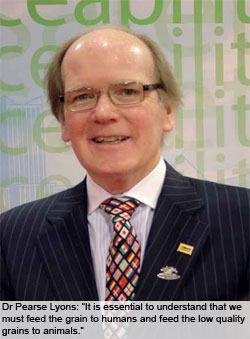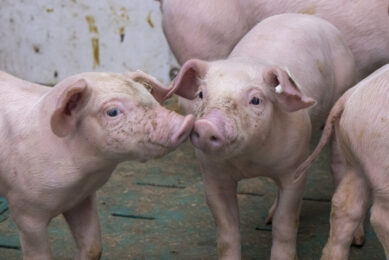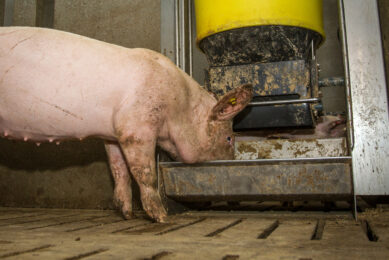Driven by science and education, for thirty years

This year global animal health and nutrition company Alltech celebrates its 30 year jubilee. The festivities are no reason for complacency, says Dr Pearse Lyons, founding father, owner and president of the company. “Started as a pure animal nutrition company we are now turning our focus to animal health solutions and educational programmes.”
By Emmy Koeleman and Ad Bal
Everything has a reason at Alltech; even the the company’s logo tells a story – that of a strong family bond present within the company. “The first three letters come from my daughter’s name: Aoife Louise Lyons, explains Dr T.P. (Pearse) Lyons. ‘Tech’ simply comes from ‘Technology’. Not to leave out our young son Mark, we let him decide on the colour of the logo – his preference was orange. Since then, our house colour has always been orange, everywhere in the world. To symbolise the scientific character of our company, we created a microscope in the letter A of Alltech.”
Dr Lyons’ passion for research, education and his eye for detail helped him reach the decision to establish Alltech in 1980, to use natural yeast fermentation and enzyme technology to produce animal feed additives. Ever since, Lyons has been the face of the company. “Yeast products used to be waste products, we wanted them to turn into valuable natural feed additives,” Lyons explains. Currently, his company employs a staff of over 2,000 and has offices all over the world. Annual revenues reached US$500 million in 2009 and the company’s annual growth is still 20% on average. This figure of 20% growth/year is the key target for the years to come as well.
Science and teaching
“The story of Alltech is not an overnight success,” Lyons says. The company has invested a lot of money in science and new offices and production facilities around the world.
Can organic growth be the only key to success? “Our success comes from the ‘wonderful marriage between the primacy of science and the primacy of education’,” explains Lyons, an educator himself. “I love teaching and in the early times of the company I wrote some textbooks on yeast. These were well received and from then on, the philosophy of Alltech became more widely accepted, better known and took off. Because we understood yeast fermentation, we further specialised in this area to benefit the animal feed industry,” he says.The combination of science and teaching is the red line when speaking about Alltech. Together with the 150 in-house scientists, Alltech has established relationships with research institutes and universities all over the world, like the University of Kentucky, bridging the gap between science and education. He mentions that – together with these research institutes – the Nutrition Research Alliance was formed, which is specialised in poultry nutrition.“Although some people ask whether such an alliance is not too commercial, we are convinced that this is not the case, because these research institutes are also aware that when they lose their independence, they lose their credibility,” Lyons continues to say. “Currently we are spending over 11% of our revenue on R&D. That’s a huge amount of money, but we have to do this if we wish to keep taking the lead.”
Sustainable agriculture
Apart from the need to invest in fundamental science and education, the company also plays a role related to sustainability in agriculture. Lyons says, “We must realise that the world population is growing tremendously and all mouths need to be fed. So we have to find alternative solutions for animal diets.”
He refers to the current competition of grains for livestock feed, human food and biofuels. “It is essential to understand that we must feed the grain to humans and feed the low quality grains (such as wood shavings and plant stems) to animals. By stepping up the quality of these products by adding natural feed additives, it becomes easier to feed these low quality grains to livestock,” he explains.
“Solutions do not necessarily lie in new products, as there are too many magic mixtures in the market. Our strategy is to focus on a limited number of products and make them work to their full potential.”Lyons refers to the company’s own vision, in the past, to introduce a new product on the market every six months – causing pressure. Lyons explains a change of vision. “We decided not to get dragged into that rat race. Of course, when necessary we add new products (like the product EconomasE), but you have to keep a strong focus on a limited number of high quality products and excel at these.”
Strong marketing approach
“Marketing is a very important component of our strategy,” Lyons says. People in agriculture often say that marketing is not important when you are in the feed business, but farmers are actually very brand minded. They drive a branded tractor; they drink branded whiskey for example, so why wouldn’t they be interested in branded animal feed additives that they know they work.
“Our brand new Nutrigenomics Centre in Lexington for example is not just a science centre; it is also our flagship facility at the same time. Our global headquarters next to it is also a very special building with all kinds of different decorated rooms, all with a meaning. It represents our global scope with a unique combination of science and our vision on animal nutrition.
“The true highlight from a marketing point of view is being the main sponsor of the Alltech FEI World Equestrian Games 2010, which are to be held here in Kentucky this coming September/ October. By committing to such a large public event we gain strong public recognition which we think is very important.”
Organic growth
Alltech is focused on organic growth. “We never acquired other companies, as it is difficult to merge the Alltech philosophy with a different company culture,” Lyons says. Even in recent years, when the economy slowed down, Alltech maintained an annual strong growth. “Of course we also had to cut costs, we cut down on travel (we use more webinars and online meetings for example) and we decided to start manufacturing in regions where our main markets are. A good example of this is our new plant in Serbia in which we invested US$50 million,” Lyons explains.
“To keep the staff motivated, they all got a salary rise,” Lyons says. Why? “Is anybody willing to work for a company that cuts salaries? We don’t believe so.”
| Dr Pearse Lyons Dr Pearse Lyons is the founder and president of Alltech. Lyons received his bachelor’s degree from the National University of Ireland in Dublin and pursued his master’s and doctoral degrees at the University of Birmingham, England. He later worked as a biochemist in Irish Distillers before founding Alltech in 1980. Lyons received the State Export Award for Kentucky and was acknowledged as the leader of one of the top 100 fastest-growing high-tech companies by World Trade Magazine. He was the Kentucky recipient of the Entrepreneur of the Year in 1993. Lyons has been recognised for his contribution to science and industry and has been awarded honorary doctorates from the University of Plymouth, England, and Heriot-Watt University, Scotland. His alma mater, University College, Ireland, Dublin, selected Lyons as one of its honorary doctorates on the occasion of its 150th anniversary. Recently, he was recognised as one of the top 15 Irish-American life scientists of the year by Biolink USA-Ireland. He has authored more than 20 books and numerous research papers in scientific journals. |
Health focus
What do the next 30 years hold? “I cannot predict that, because it is too far ahead,” Lyons says. “However, I am convinced that Alltech will remain a family-owned company. Why sell it? Alltech is a healthy company. We make good profit, which is a measure for independence. There are still plenty of opportunities to grow and we will do so. And although we have always been known as an animal nutrition company, we feel that that is a too narrow approach. Our aim therefore is to expand our focus on animal health solutions and maybe even market our human health products commercially.
“We are conducting ethical, highly advanced research and through this we are contributing to supplying safe food of animal origin. We want to be remembered as the most innovative company in the fermentation business,” Lyons concludes. “That’s where our focus will be in the years to come.”











